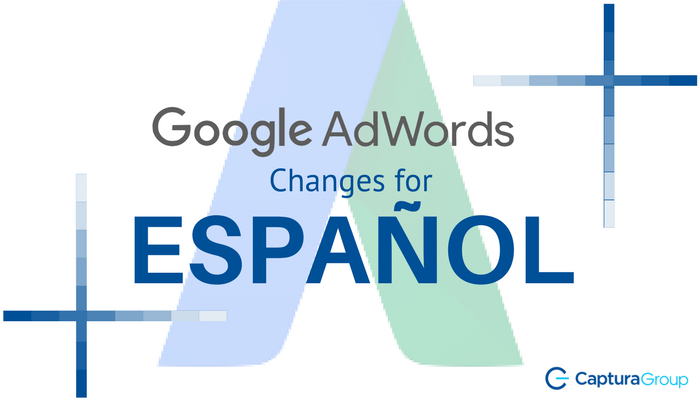We are passionate about the Spanish language. Being a Hispanic digital agency, it’s in our DNA. On this blog, we’ve talked about the importance of nuance, the benefit of a dual language strategy, and even when to use Spanglish to connect with U.S. Hispanics.
Our commitment to the Spanish language is why we were thrilled to learn about expanded text ads coming to Google Adwords. Expanded text ads essentially give advertisers more room to communicate, with 50 more characters in each ad.
Standard text ads previously had one headline with a 25-character limit, while the new expanded text ads have space for two headlines, each with a 30-character limit. The description fields on standard text ads were limited to two 35-character lines, but expanded text ads offer one robust 80-character description space. Advertisers are also allowed more freedom where it comes to the display URL, with path fields available to better describe your landing page.
Here’s a visual of standard text ads next to the updated expanded text ads:
![]()
Expanded text ads also have no device preference, meaning the same message will be relayed on desktop, tablet and mobile. This device agnostic approach pushes the mobile-first way of digital in 2017; just remember to make sure your ad messaging works at every device level.
So, why does this monumental change get us excited to implement these changes in Spanish ads? Three reasons: more space for context, increased parity with English brand messaging, and better flow of language.
Context is Key
As any Spanish content writer will tell you, written Spanish is about 30% longer than written English. That can be frustrating in the world of digital advertising, where character limits are stringent. Also, when writing ads for U.S. Hispanics in particular, there is often a level of context needed to communicate a brand message that uses language unfamiliar to non-native English speakers.
For example, a colloquial phrase, technical term, or play on English words may not translate directly to a clear Spanish equivalent. Adding up to 50 characters to Adwords ads means an increased opportunity to provide the context needed in these situations. As one of our bilingual content writers noted, “Giving Spanish ads more room to educate with context also gives more room to communicate an actionable brand message.” Finally, an end to sacrificing actionability for clarity.
1:1 Brand Messaging
While targeting U.S. Hispanics is gaining traction in General Market digital advertising, Hispanic campaigns are still often built on a General Market creative idea. Ideally, the two should be integrated, but where brands run into messaging trouble is when the key phrase or tagline used needs either context (see above) or simply more space to communicate in Spanish. With increased character counts in Adwords, there’s a better chance of parity between English and Spanish ads. The timing implications are also encouraging since a 1:1 message between English and Spanish is more likely to sail right through legal and internal reviews. Project managers rejoice!
Flow, Baby, Flow
One reason written Spanish is longer than English is the prevalent use of prepositions, or connectors. For example, the phrase “Prueba limpiador pisos” or “Try floor cleaner” is much clearer as an ad when adding connectors: “Prueba este limpiador de pisos” or “Try this floor cleaner.” These connectors can be omitted to save space in AdWords, but the result is an ad that doesn’t flow naturally. That can lead to confusion for Spanish-preferring audiences, or worse – the assumption that the brand is unauthentic and indifferent to the nuances of the language. The extra characters in expanded text ads mean the return of Spanish language ads that flow naturally with “proper” Spanish.
We’re excited to implement expanded text ads across our Adwords accounts, especially with the news that most advertisers are seeing up to a 28% increase in CTR. If the results are positive for English ads, we can only imagine the success we’re in for with Spanish ads. ¡Adelante!
